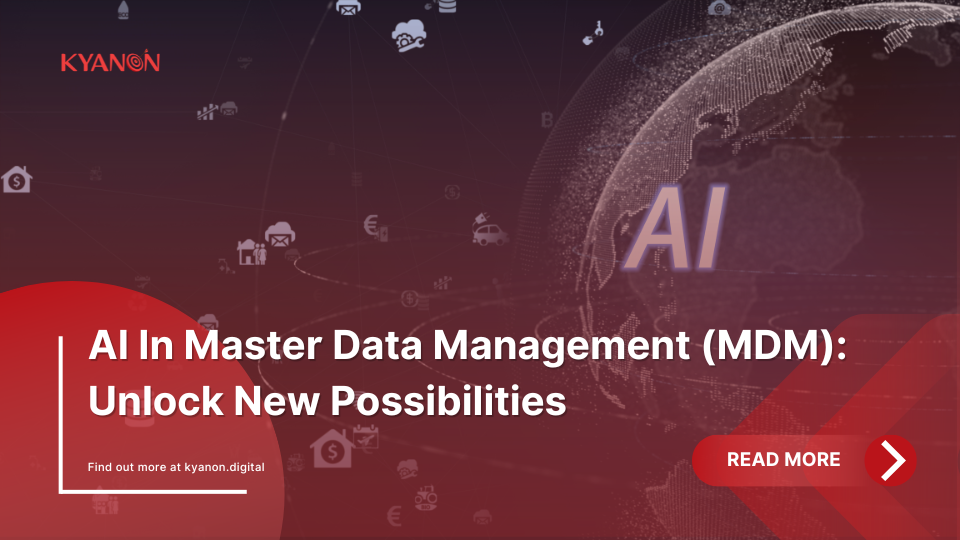Introduction
In today’s rapidly evolving digital environment, businesses depend on Master Data Management (MDM) to ensure their data is accurate, consistent, and easily accessible. However, traditional MDM approaches often struggle with the complexities of big data, resulting in inefficiencies and missed opportunities. This is where Artificial Intelligence (AI) steps in, changing the way organizations manage and leverage their master data.
This blog will explore how AI is transforming MDM, creating new opportunities for businesses to tackle challenges and promoting a more intelligent, efficient data ecosystem.
Further reading
Master Data Governance: Turning Clicks into Cash
Data Governance and MDM: Choosing the Right Data Management Approach for Your Business
How Does Master Data Management Impact AI Strategy?
1. The Role of AI in Modernizing MDM
AI in data management uses advanced technology to improve MDM. It includes machine learning, natural language processing, and automation. Here’s how AI is transforming master data management (MDM) solutions:
- AI algorithms find and fix errors. This boosts data quality, without human help.
- Scalability: AI excels at processing huge data sets. It’s ideal for big data businesses.
- Automation: It streamlines repetitive tasks like data cleansing and deduplication. This saves time and cuts costs.

The impact of AI in Master Data Management
2. Key Benefits of AI in Master Data Management
AI-powered MDM offers numerous advantages for businesses. It enhances data accuracy and efficiency, while also improving decision-making and streamlining operations.
2.1. Improved Data Quality
AI tools can greatly improve data accuracy through features like automated data cleansing, deduplication, and validation. According to Gartner, poor data quality costs businesses $12.9 million annually. By leveraging AI, organizations can reduce these losses and maintain consistency across their systems.
2.2. Faster Decision-Making
Machine learning in data management facilitates real-time data analysis, allowing organizations to make swift, informed decisions. According to a McKinsey report, data-driven companies are 23 times more likely to outperform their competitors.
2.3. Enhanced Data Integration
AI eliminates data silos by integrating various data sources into a unified platform. This capability is essential for large organizations that handle data across multiple departments or regions. According to a Flexera study, serverless data integration can reduce costs by as much as 40% compared to traditional approaches.
2.4. Cost and Time Savings
AI-powered automation reduces the need for manual effort in repetitive master data management tasks, resulting in significant cost savings. A Deloitte study indicated that AI-driven automation reduced data management costs by 40% for businesses.
The integration of AI in master data management is transformative, enabling organizations to remain competitive in today’s data-driven landscape.

Key benefits of AI in Master Data Management
3. Use Cases of AI in MDM
The applications of AI in master data management span various industries and functions. Here are some prominent use cases:
- Customer Data Management: AI enables personalized marketing and customer experiences by providing accurate and up-to-date customer data.
- Product Data Management: Businesses leverage AI to streamline product catalogs, inventory tracking, and pricing updates.
- Supplier Data Management: AI optimizes procurement processes by ensuring supplier data is accurate and accessible.
- Compliance and Governance: AI helps organizations meet regulatory requirements through enhanced data tracking and reporting.
By addressing specific needs across industries, AI-powered MDM delivers measurable results and tangible value.

Use cases of AI in Master Data Management
4. Overcoming Challenges in AI-Driven MDM
While the benefits of AI in master data management are clear, implementing AI-driven solutions comes with its own set of challenges:
- Data Privacy Concerns: Ensuring secure data handling and compliance with privacy regulations.
- Technical Complexity: Integrating AI into existing MDM systems requires robust infrastructure and expertise.
- Change Management: Educating teams and aligning stakeholders on the benefits of AI adoption.
To overcome these hurdles, organizations should:
- Set clear objectives for AI implementation.
- Invest in training and upskilling their teams.
- Partner with experienced providers of AI-enhanced master data systems.
Kyanon Digital is a trusted partner for organizations seeking AI-enhanced master data systems. With years of experience and a proven track record in delivering advanced, data-driven solutions, we offer the expertise and innovation necessary to help businesses optimize their data management processes.
5. Key Differences: AI-Driven MDM vs Traditional MDM
As these changes unfold, the distinctions between AI-driven and traditional MDM approaches have become increasingly evident. Below are some key differences across various aspects of data management.
Traditional MDM | AI-Driven MDM | |
| Data Integration | It relies on manual processes and fixed rules for data integration. This can cause delays and inconsistencies. | It uses machine learning to automate data integration. This cuts processing time and boosts accuracy. |
| Data Quality Management | It uses static, rule-based methods for data quality checks. They may miss complex or evolving data issues. | It uses advanced algorithms to find and fix data quality issues in real time. It adapts to new patterns and data complexities. |
| Scalability and Flexibility | It often struggles with scalability, especially with big data and diverse sources. | It offers great scalability and adaptability and can handle large data from various sources and adapt to changing data. |
| Decision Support | It provides static reports and limited insights based on historical data. | It provides advanced analytics and insights. This enables data-driven decisions and proactive data management. |
6. The Benefits of Transitioning to AI in MDM
As data volumes surge and sources diversify, organizations are discovering that traditional MDM approaches can no longer meet their evolving data management needs. Incorporating AI into master data management brings numerous benefits that address these challenges and offer substantial advantages
- Increased Efficiency: Automates repetitive tasks, allowing data teams to concentrate on more strategic initiatives.
- Improved Data Accuracy: AI algorithms continuously learn and adapt, minimizing errors and enhancing data quality.
- Enhanced Data Governance: Establishes robust, adaptable governance frameworks that stay in sync with evolving regulatory requirements.
- Real-Time Insights: Facilitates faster, data-driven decision-making with real-time processing and analytics.
- Cost-Effectiveness: Lowers long-term expenses related to manual data management and error correction.
7. The Future of AI in Master Data Management
The future of AI in master data management promises even greater advancements, including:
- Predictive Analytics: AI will enable proactive decision-making by predicting trends and anomalies.
- Augmented Decision-Making: AI will assist human decision-makers with intelligent recommendations.
- Fully Automated MDM Ecosystems: The integration of AI and big data technologies will create dynamic, self-sustaining MDM systems.
As these trends continue to evolve, businesses must stay ahead by embracing AI-driven innovation in MDM.

The Future of AI in Master Data Management
Conclusion
The integration of AI in master data management is revolutionizing the way organizations manage, analyze, and leverage their critical data. From improving data quality to enabling real-time insights, AI is unlocking possibilities that were once unimaginable.
Businesses ready to embrace this transformation can gain a significant competitive edge by adopting AI-powered MDM solutions. Whether it’s improving operational efficiency, enhancing customer experiences, or driving compliance, AI is the key to mastering the future of data management.
If you’re ready to explore innovative master data management solutions, contact Kyanon Digital today to discover how AI can transform your data strategy.
Key Takeaways
- AI Enhances Traditional MDM Approaches: As data volumes increase and sources diversify, AI integration in Master Data Management (MDM) offers advanced capabilities to address these challenges more effectively than traditional methods.
- Increased Efficiency: AI automates repetitive tasks in data management, enabling teams to focus on higher-value activities like strategic analysis and decision-making.
- Improved Data Accuracy: AI algorithms continuously evolve and improve, reducing human error and ensuring better data quality through ongoing learning and adaptation.
- Stronger Data Governance: AI-driven MDM frameworks provide adaptable governance structures that can keep pace with changing regulations, offering more robust compliance and control.
- Cost Savings and Scalability: By reducing manual processes and minimizing errors, AI helps organizations cut long-term costs and scale data management operations effectively.
FAQs
AI-driven Master Data Management (MDM) involves integrating artificial intelligence to automate data governance, enhance data quality, and improve decision-making. It uses machine learning algorithms to continuously refine data processes, ensuring consistent and accurate master data management.
AI improves data accuracy in MDM by learning from patterns in data, identifying discrepancies, and automatically correcting errors. This leads to more reliable, accurate, and high-quality data across the organization.
The main benefits of AI in MDM include enhanced efficiency through automation, better data accuracy via continuous learning, stronger data governance to comply with regulations, real-time insights for faster decisions, and cost reduction by minimizing manual intervention and errors.
Yes, AI in MDM strengthens data governance by providing adaptive frameworks that evolve with regulatory changes, ensuring better compliance, and automating tasks to reduce risks related to data management and governance.
AI-driven MDM is especially beneficial for organizations managing large, complex datasets or those navigating evolving regulatory requirements. It may not be necessary for smaller businesses with simpler data management needs but can greatly enhance scalability and efficiency for larger enterprises.
References
- Insights into the key differences between AI-Driven MDM and Traditional MDM from Semarchy
- AI tools and data quality insights sourced from Gartner “How to Improve Your Data Quality”
- Data-driven decision-making insights sourced from McKinsey report “The state of AI in 2023: Generative AI’s breakout year”
- Serverless data integration insights sourced from Flexera study “Reduce risk and costs for software assets”


